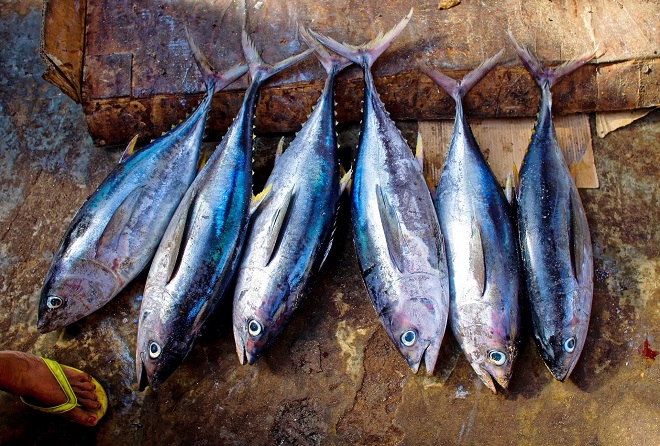A hammock between two palm trees, the view of the ocean, the sun in the back, and a freshly grilled fish for dinner.
That’s what the perfect vacation looks like, for most people.
And is there any better place for that than Raja Ampat?
Where the underwater world is still diverse, and local fishermen drive out for a catch to supply their own families? Where we don’t have to think about big fish farms and the negative effects of this industry?
Should we simply indulge in a never-ending fish feast, or should we watch our consumption here as well?
Let’s have a closer look at 3 important fish facts, you should still keep in mind – even in a paradise like Raja Ampat.
Omega 3, Saturated Fats and Cholesterol
Eating fish regularly is part of a healthy diet, right?
One should rather reduce eating meat and add more fish because it’s the healthier alternative – at least we’ve learned that.
And yes, it’s true, in fish you’ll find omega-3 fatty acids, which are healthy and important for us because the body can’t produce them itself. Omega 3 fatty acids are responsible for metabolism and have an anti-inflammatory effect on the body.
So how much fish do we have to eat to get our recommended amount of omega-3 fatty acids?
Nowadays we know, that the fish we would have to eat to get our recommended omega-3, would contain far more toxins than our body should handle. So in the effort to eat healthily, we are actually doing more bad than good.
Instead, it would be much better to add omega-3 alternatives to our diets, such as chia seeds, walnuts, Brussels sprouts, flax seeds, and kidney beans.
And what about saturated fats and cholesterol everyone warns about when consuming meat? Unfortunately, almost the same amount can be found in fish. Between 15 and 30% of the fats are saturated fats that make the liver produce more artery-clogging cholesterol – which results in a higher risk for cardiovascular diseases.
Maybe eating fish isn’t as healthy as we think?
Mercury and other Chemicals
Surely everyone still remembers the news when mercury was found in fish.
Mercury is a heavy metal that can be released through industrial processing (like burning coal) or natural events (like eruption). It can be found in the air, water and soil. Even small amounts are highly toxic to the human body and can cause serious health problems – especially in the nervous system.
Fishes absorb any substances from the water surrounding them. Small fishes get eaten by bigger ones, these ones again by bigger ones, and so on. As mercury accumulates over time, the further we go up the food chain, the higher the percentage of toxins in the fish. That means for us: the bigger the fish, the higher the mercury. This affects, for example, king mackerel, Spanish mackerel, all varieties of tuna, blue marlin, grouper, and snapper.
But it’s not only mercury that can be found in fish. Substances such as PCBs, Dioxin and other toxins enter the human body when consuming fish and remain there for decades. Liver damage, nervous system disorders, kidney damage, and a high risk for cancer can be the consequences.
Pollution
Anyone who has already seen a beach in Indonesia after monsoon season can only imagine what else is floating out there in the ocean. Several times a year, tons of plastic waste is washed ashore on the most beautiful beaches in Southeast Asia, including Raja Ampat.
Find out how to reduce your plastic footprint while traveling.
Once you know that fish absorb whatever substance is in the water surrounding them, you can imagine what that means.
Researchers at the University of Ghent in Belgium found out that seafood eaters ingest 11.000 tiny plastic particles each year, and dozens of the particles stay in their tissues. Isn’t that frightening?
And as if plastic waste wouldn’t be the biggest issue, just try to think about where the sewage ends up, in a remote area without proper sewage systems. In addition to an immense amount of toxins, there are countless other bacteria in our oceans that we ingest when consuming fish. Imagine filling a glass with ocean water and taking a sip of it.
Is this what we want to think about when putting our fish on the grill?
Conclusion
A vacation in paradise gives the perfect setting for a fish & seafood barbeque on the beach. But even when having freshly caught fish, we should be mindful when consuming it. Plastic waste, toxins, and other substances enter our bodies by climbing up the food chain and can have serious consequences. Moderate consumption is the key.
Or what if you decide to watch fish underwater instead?
Do you eat fish? When and how often?
Image by Kevin Phillips from Pixabay




